

Online Harms White Paper - Govt response (2020) Presented to Parliament by the Secretary of State for Digital, Culture, Media and Sport and by the Secretary of State for the Home Department by Command of Her Majesty on 15 December 2020 Command Paper Number: 354 Crown Copyright 2020 Joint Ministerial foreword Our world is now a digital one.
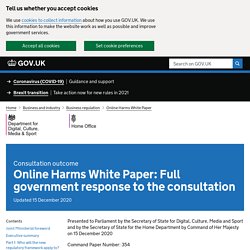
From connecting with loved ones, to the way we do business and deliver public services - almost every part of our lives is at least now partly online. But the COVID-19 pandemic has shone a spotlight on the risks posed by harmful activity and content online. This government is unashamedly pro-tech. The government’s response to online harms is a key part of our plans to usher in a new age of accountability for tech companies, which is commensurate with the role they play in our daily lives. This response to the Online Harms White Paper sets out plans for a new duty of care to make companies take responsibility for the safety of their users. And this regulation will be proportionate.
Executive summary 1. Online Harms White Paper (2019) Joint Ministerial foreword The internet is an integral part of everyday life for so many people.
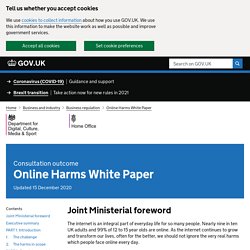
Nearly nine in ten UK adults and 99% of 12 to 15 year olds are online. As the internet continues to grow and transform our lives, often for the better, we should not ignore the very real harms which people face online every day. Essential digital skills framework (2018) This framework has been designed to support providers, organisations and employers across the UK who offer training for adults to secure their essential digital skills.
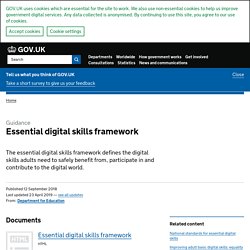
The frameworks sets out 5 categories of essential digital skills for life and work: communicating handling information and content transacting problem solving being safe and legal online There is also information about foundation skills, which are typically required by those not currently using digital technology or using it in limited ways. Digital Charter (2018) We want to make the UK both the safest place to be online and the best place to start and grow a digital business.
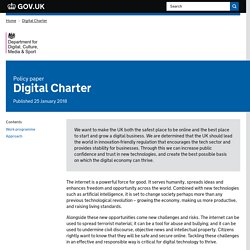
We are determined that the UK should lead the world in innovation-friendly regulation that encourages the tech sector and provides stability for businesses. Through this we can increase public confidence and trust in new technologies, and create the best possible basis on which the digital economy can thrive. The internet is a powerful force for good.
It serves humanity, spreads ideas and enhances freedom and opportunity across the world. Combined with new technologies such as artificial intelligence, it is set to change society perhaps more than any previous technological revolution – growing the economy, making us more productive, and raising living standards. Alongside these new opportunities come new challenges and risks. Enhancing digital skills across Europe. UK Digital Strategy (2017) UK Government Digital Service blog. UK Government Assisted digital blog. UK Government Digital Engagement blog. DCMS Digital Inclusion Outcomes Framework. The Digital Inclusion Outcomes Framework is a single, flexible template for benchmarking and tracking digital inclusion in the UK, and evaluating digital inclusion activities locally.
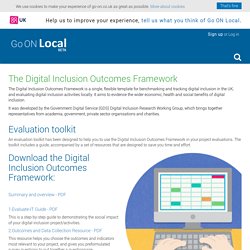
It aims to evidence the wider economic, health and social benefits of digital inclusion. It was developed by the Government Digital Service (GDS) Digital Inclusion Research Working Group, which brings together representatives from academia, government, private sector organisations and charities. Evaluation toolkit. Home – Digital literacy unpacked. H of Commons report on Responsible Use of Data. H of Lords report on digital skills. Recommendations The report, entitled "Make or Break: The UK's Digital Future", urges the incoming Government to seize the opportunity to secure the UK’s place as a global digital leader by, among other things: making digital literacy a core subject at school, alongside English and Maths; viewing the internet as important as a utility, accessible to all; andputting a single ‘Digital Agenda’ at the heart of Government.
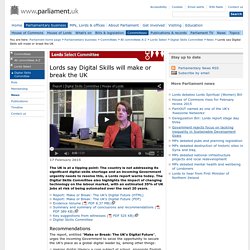
The report also noted that there are certain sectors of society, and UK regions, falling behind at great cost to the economy; and that industry has a vital role to play in developing the right skills in the workplace, in further and higher education, and in schools. The report also found that there is a distinct lack of Government coordination on digital initiatives – the current digital 'activity' within Government includes four Government Ministers, a Taskforce, a Committee, and a Unit.
Committee Chairman Call for action The economy -millions of jobs are at risk of automation. Review of Publicly Funded Digital Skills Qualifications. Introducing the new digital inclusion team. We’re setting up a new team to work in government and beyond to increase the digital skills of the UK.
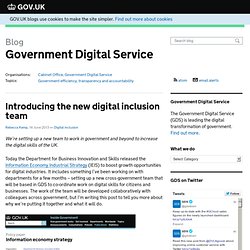
Today the Department for Business Innovation and Skills released the Information Economy Industrial Strategy (IEIS) to boost growth opportunities for digital industries. It includes something I’ve been working on with departments for a few months – setting up a new cross-government team that will be based in GDS to co-ordinate work on digital skills for citizens and businesses. The work of the team will be developed collaboratively with colleagues across government, but I’m writing this post to tell you more about why we’re putting it together and what it will do. Why are we doing this? UK Govt's Digital Inclusion Strategy.
Last December, we published action 15 of the Government Digital Strategy to show the government’s commitment to digital inclusion.
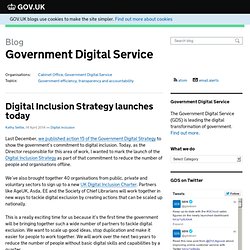
Today, as the Director responsible for this area of work, I wanted to mark the launch of the Digital Inclusion Strategy as part of that commitment to reduce the number of people and organisations offline. We’ve also brought together 40 organisations from public, private and voluntary sectors to sign up to a new UK Digital Inclusion Charter. Partners like AgeUK, Asda, EE and the Society of Chief Librarians will work together in new ways to tackle digital exclusion by creating actions that can be scaled up nationally. This is a really exciting time for us because it’s the first time the government will be bringing together such a wide number of partners to tackle digital exclusion. We want to scale up good ideas, stop duplication and make it easier for people to work together. 1. 2. 3. 4. 5. 6. 7. 8. 9. 10.
Lloyds bank consumer digital index 2017. Doteveryone. Tech Partnership. Go ON UK. Basic Digital Skills Definition. In the UK, 1 in 5 adults lack the following Basic Digital Skills.
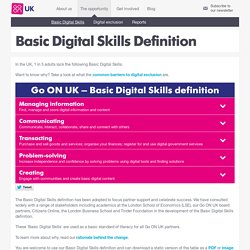
Want to know why? Take a look at what the common barriers to digital exclusion are. UK Digital Skills Taskforce. Jisc Developing Digital Literacies programme. 'By digital literacy we mean those capabilities which fit an individual for living, learning and working in a digital society.
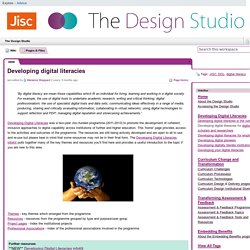
For example, the use of digital tools to undertake academic research, writing and critical thinking; digital professionalism; the use of specialist digital tools and data sets; communicating ideas effectively in a range of media; producing, sharing and critically evaluating information; collaborating in virtual networks; using digital technologies to support reflection and PDP; managing digital reputation and showcasing achievements.' Developing Digital Literacies was a two-year Jisc-funded programme (2011-2013) to promote the development of coherent, inclusive approaches to digital capability across institutions of further and higher education. This 'home' page provides access to the activities and outcomes of the programme. Themes - key themes which emerged from the programme Resources - resources from the programme grouped by type and purpose/user group. Report on Digital Skills for Tomorrow's World. DIGCOMP. Useful tools from European Get Online Week.
Happus - Hardware - Internet access - Support. UK Business Digital Index 2015. The Lloyds Bank UK Business Digital Index measures the use of, and attitudes towards, digital technology among small businesses and charities. Now in its second year, this report highlights the progress which has been made since 2014’s survey but also demonstrates that some key challenges remain. There is clearly some evidence of success, particularly in certain regions, in the development of digital maturity and there is also encouraging improvement in SMEs’ basic digital skills.
However, there is still room to do more. This year’s report also highlights that attitudes are still a barrier to doing more online, and that the charity sector in particular is being left behind in the adoption of digital.